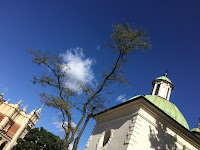My next liveblog from the The European Conference on Information Literacy (ECIL) in Krakow, Poland (this is Sheila) is of Walking, Meeting Things, Tinkering with Objects and Materials, Being with Information: Some Experiences in Information Culture presented by Yolande Maury (abstract is here). Again these are just my impressions and the wifi continues dodgy (though otherwise a lovely venue!) so I will post when I can.
This paper was based on ongoing research studying changes in information and media education in France, paying attention to emerging trends. 6 researchers are involved. The focus here was on the potential of experiential education for students in the field of information culture. Information is defined here broadly as "related to being informed" (i.e. certainly not just documents). Learners are seen as active and social beings, constructing their own worlds, with their bodies having an active role in this discovery and construction.
The focus is on two schools (college, Hauts de France). Data is collected over time, with an immersed and observational approach. Within that 3 particular projects:
- walking as a geographical learning path (as part of a geography project)
- creative production (rap slam and dance) as part of a local artistic partnership, with learners with disabilities
- "tinkering and making activities" with the library
Maury firstly talked about the walking project, which was used to introduce the geographical project in a living way, experiencing the place by moving through the city. The learners can identify the "function of each place 'seen from below'" and start to form critical ideas about what should be changed and what retained. Learners are encouraged to use all 5 senses to experience place. Having done this, the learners have to construct a story including their feelings, observations and expressions. The latter is the CLEA creative project.
This also is an exercise to co-construct a living culture, and involves collaborating with the rapper and also using the maker-space of the library to "give (concrete) form to projective scenarios" which scenario may start as an abstraction, and the learners are encouraged to be creative in matching the ideas to the type of material they use. Example swas given of a student using their own foot to represent pedestrians, paper trees and a smartphone to illustrate street lighting.
Overall this project involves starting with the students' own experience and knowledge, and leading them from the subjective experience to a secondary experience as they reflect on their experience and construct responses with words and objects. Maury showed a video created by 3 students narrating a story about their city, told through their creations and words. Also in response to a question she talked a bit more about students learning how to express information through gesture, objects etc.
Two references from the abstract
Maury, Y. (2019). Expériences sensibles en bibliothèque: Peut-on parler d’un tournant? Revue Cossi, 6, 27–40.
Maury Y., & Kovacs, S. (2020). In-former le territoire local par l’exercice scolaire. In C. Tardy & M. Severo, Dispositifs du visible et de l’invisible dans la fabrique des territoires (pp. 59–78). Paris: L’Harmattan.
Photo by Sheila Webber: Krakow main square
Curating information literacy stories from around the world since 2005 - - - Stories identified, chosen and written by humans!
Monday, October 09, 2023
Being with Information #ECIL2023
Subscribe to:
Post Comments (Atom)

No comments:
Post a Comment